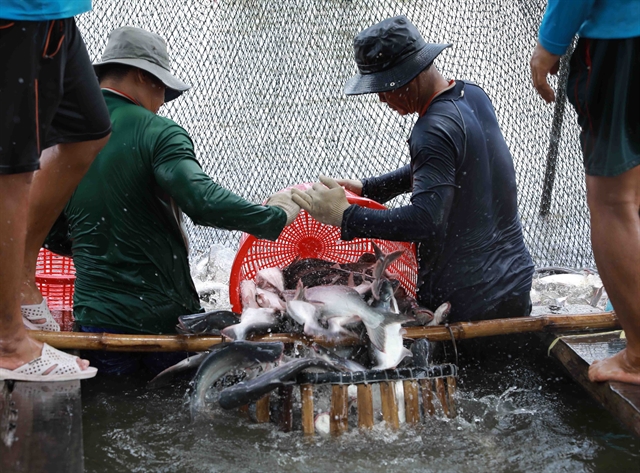 Economy
Economy


|
| Tra fish being harvested in the Mekong Delta Province of An Giang. — VNA/VNS Photo Vũ Sinh |
HÀ NỘI — Localities should establish groups and teams for harvesting fish that could facilitate the issuance of travel permits in groups instead of individual travel permits amid the COVID-19 pandemic, Deputy Minister of Agriculture and Rural Development Trần Thanh Nam has said.
Team 970 of the Ministry of Agriculture and Rural Development (MARD) will send a document to six Mekong Delta provinces, urging them to set up fish harvesting teams and create the most favourable conditions for the teams to enter fish farming areas to ensure disease safety, Nam said at the online meeting reviewing the team’s performance in Hà Nội last week.
Trương Thị Lệ Khanh, chairwoman of Vĩnh Hoàn Joint Stock Company, said tra fish processors and exporters had to cope with the growing pressure of travel for workers and the implementation of the "3 on-site" model had caused many difficulties.
"The tra fish are waiting to be harvested while farmers are facing high risk of losses. However, people in fisheries trade unions are required to quarantine for 14 days when they come to farming areas to harvest fish even though all of them have been fully vaccinated with test certificates,” she said.
Khanh suggested localities shorten the quarantine period for fully vaccinated people of her fisheries trade union, which also runs the "3 on-site" model.
She added that Vĩnh Hoàn planned to expand production to release the amount of stockpiled tra fish, but it was hard for her company to call for employees to work under the "3 on-site" model because they could encounter difficulties going through COVID-19 checkpoints due to lack of travel permits.
Without travel permits our employees cannot go outside, not to mention having to undergo COVID-19 tests in order to come back to work, Khanh said.
Meanwhile, the implementation of "3 on-site" model was also problematic.
The chairwoman said that the longer the time her company runs the "3 on-site" model, the higher production costs it had to face.
"We have implemented this model for two months. Every week, we have to conduct PCR tests, which is very costly."
She suggested that only 20 per cent of workers should be tested instead of 100 per cent of them as at present.
At the event, Nguyễn Tấn Nhơn, deputy director of Cần Thơ Department of Agriculture and Rural Development, said the city now had 38,500 tonnes of tra fish in stock while 90 per cent of its processing plants had to temporarily stop operating due to their failure to implement "3 on-site" model.
Thus, he petitioned the MARD to send documents to localities and functional sectors, requesting them to prioritise vaccination for workers in the agricultural production chains.
"Currently, vaccination priority is given to workers in processing factories rather than those in raw material harvesting areas as each group can have between 40 and 50 people,” Nhơn said. “Without vaccination for the above-mentioned workers, it will be difficult for processing firms to reorganise their productions,"
Nhơn added that these workers also found difficulties in travelling from their houses to harvesting areas as some localities prioritise travel permits for individuals working at agencies or businesses providing essential services or those allowed to transport essential goods.
Sharing Long An's story in facilitating the transport and circulation of agricultural products, Đinh Thị Phương Khanh, deputy director of the provincial Department of Agriculture and Rural Development, said that the province had fisheries trade unions in two districts - Tân Thạch and Tân Hưng.
When the fisheries trade union in Tân Thạch was short of people, the department would request the functional forces to facilitate the support of Tân Hưng in farming fish, Khanh said, adding that tests for SARS-CoV-2 were essential.
Over the past seven months, Việt Nam earned US$906.6 million from exporting tra fish, up 14.6 per cent over the same period of last year. Mainland China, Hong Kong and the US were the three largest importers of Vietnamese basa with respective turnovers of $238 million and $202 million.
According to the Việt Nam Association of Seafood Exporters and Producers (VASEP), the pandemic has had a significant impact on the sales strategy of Vietnamese seafood enterprises.
Besides reducing trade activities due to social distancing in many countries, high transportation costs and shortage of containers had also had a great impact on Việt Nam’s seafood exports, it said.
This forced local seafood processing and exporting enterprises to change their sales strategies to keep customers and overcome difficulties, according to VASEP. — VNS




